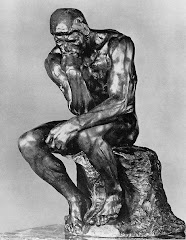My affirmation of ancient Hindu philosophy, Buddhism & Christianity is rooted in its grasp of the timeless truth that self-realization is self-expansion.
Growth is enlargement, and joy is contained in expansion.
This is not a growing big in physical dimensions, but an extension of limits, of pushing back horizons, of stretching the diameter of the circle of our consciousness, of breaking down walls & hacking away the obstructing brushes towards new landscapes.
This, in turn, is not conquest by subjugation - not establishing mastery over things.
Because mastery over things is nothing but making permanent our separativeness from them, of asserting our isolated existence over theirs.
It is establishment of the reign of fear - the fear of conflict & the fear of loss of control.
Therefore conquest is synonymous with despoilation, ravishment, plunder, loot, degradation. Conquest demands an adversary who poses a threat and a challenge of destruction. And an adversary is one whom we fear, however weak it might be, and however strong we might think we are, in our arrogant self-delusion.
Ancient spirituality, or mystical philosophy - or whatever you may chose to call it - sought to establish harmony not by recognizing (or holding as the primary focus) the conflict aspect of things - but the relatedness & harmony which exists between the all. It sought to solve the problem of fear not by being conscious of it every moment & fighting it, but by rooting it out of man's consciousness, & from the very face of existence. By being conscious of the fact that, in the ultimate, there is no cause for fear, and there is nothing to be feared. It sought to solve the problem of death not by affirming it completely, but by extinguishing death itself. And that was the great achievement of Jesus Christ: Jesus' triumph over death is the triumph of love over fear - of ultimate truth above superficial fact.
And thus, enlargement in a Sakyamuni or a Jesus did not take the form of establishing or setting up borders beyond borders, but by annihilating all borders.
Man is an Ocean, say the poets: the sages correct: Man is an endless ocean.
This idea of IMMENSITY was what attracted me first, and drew me in.
They who loved God were those who were aching to grow into the boundless: in them the principle of expansion knew that never through the use of his rational faculty, by intellectual analysis, by words & mathematics, by the use of his senses & limbs - can the INDIVIDUAL reach the ENDLESS with the totality of his being. Never can the senses & mind comprehend the All. For, by its very nature, the body & mind cannot deal with the totality as one - it can only deal with parts, fragments, and only in terms of bits & pieces of knowledge, however titanic & sophisticated. They knew that the principle of freedom, & rebellion against the unchosen tyranny of law, was rooted in a different realm altogether, and in that source was their final aim. That, in the ultimate, nature did not have be conquered to annul its tyranny, but had to be transcended.
Law rests on difference, and a philosophy of power rests on differentiation.
Recognition of difference rests on recognition of separativeness, of potential & actual conflict of interests. There is a difference between the I and the Non-I. The I is perishable, and seeks to continue. The Non-I is perishable, and seeks to continue, or isn't aware of the I, at all. Hence the difference, hence fear, hence the quest power, hence the struggle of conquest.
If my I is imperishable - if I am immortal - I destroy fear.
If the Non-I is fundamentally One with me - if I am infinite - I love.
And thus, the problem of difference found its true solution in realization of the fundamental non-existence of difference, in grasp of fundamental unity. That is, the philosophy of love.
The wisdom of old sought to solve problem of extension not by finalizing differences, but by finalizing identity. And that could only lead to love for the All.
In psychological terms, Christianity realized that Love is the force through which man grows into infinity, grows wide - large - in the highest sense of the term. It is the force through which he keeps growing into a wider, more expansive 'ME'. For Love happens only when the boundaries between the Me and the Non-Me dissolve; and active love is the force which dissolves the difference between Me & Non-Me.
True self-expansion is expansion in love & sympathy & relatedness - which is an ever-growing internal realization of love for all - an ever-growing sense of deathelessness & fearlessness.
Love is possible only when there is no Fear. The lesser we fear, the more we love. And fear rests on difference, on separativeness, on a false idea of self & life - on egoity, mortality & finiteness.
Love for the All is an expression of a man's infinity & immortality.
And that's why I do affirm that the highest truth of self-realization is to be found in the Vedas & Upanishads, in the Sutras, and in the New Testament.






No comments:
Post a Comment